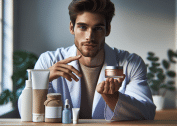Interested in youthful skin and healthy hair? Explore the science behind collagen myths, what actually affects collagen production, and why understanding collagen’s role in wellness and beauty can help you make more informed choices about skincare and dietary supplements.
The Truth About Collagen and Skin Health
Collagen plays a critical role in maintaining the firmness and elasticity of the skin. As one of the most abundant proteins in the human body, it gives structure to skin, hair, and nails, making it a favorite topic in the world of wellness and beauty. Many individuals seek out collagen supplements and skincare products, hoping to improve the appearance of wrinkles, hydrate skin, and achieve a more youthful glow. Yet, not all products deliver the same results, and the way collagen works within the body is often misunderstood.
It’s a common belief that consuming collagen peptides will directly result in smoother, firmer skin. However, experts clarify that dietary collagen is broken down during digestion into amino acids, some of which may be used for skin repair, while others support functions elsewhere. Topical collagen creams, heavily promoted in beauty routines, face the challenge of collagen’s large molecular size, which limits its ability to penetrate deeply into the skin layers where it would truly be effective. This often leads consumers to question what methods genuinely support collagen production and skin health (Source: https://www.health.harvard.edu/staying-healthy/collagen-supplements-what-the-research-shows).
Professional dermatology groups recommend a holistic approach to collagen health—focusing not only on products, but also on nutrition, sun protection, and healthy habits. Vitamin C, for example, plays a crucial role in natural collagen synthesis, while antioxidants in fruits and vegetables help counteract damage from UV exposure and pollution. By combining internal and external strategies, individuals may find a more sustainable path to enhancing their skin’s appearance and vitality (Source: https://www.aad.org/public/everyday-care/skin-care-basics/nutrition/collagen).
Collagen Supplements: Are the Benefits Supported?
The supplement market is flooded with powders, capsules, and drinks promising to boost the body’s collagen production. Research findings on these products have been mixed. Some clinical studies suggest that daily intake of collagen peptides may modestly improve skin hydration, elasticity, and the appearance of fine lines over several weeks. However, researchers emphasize that these benefits are often modest and seem most notable in older adults with already diminishing collagen levels (Source: https://www.ncbi.nlm.nih.gov/pmc/articles/PMC6835901/).
It’s important to recognize that not all collagen supplements are created equal. Some contain types I and III collagen, which appear most supportive of skin and connective tissue health, while others focus on joint or bone benefits. Additionally, manufacturing processes and sourcing can affect purity and potency. Reading product labels, understanding ingredient lists, and consulting reputable health organizations are essential steps in making informed choices about any supplement for beauty or wellness.
Experts recommend incorporating supportive nutrients alongside collagen supplementation. Vitamin C, zinc, and copper all contribute to collagen synthesis in the body, so a varied diet rich in these elements can help maximize any possible benefits. Ultimately, a well-rounded approach—eating nutrient-rich foods, avoiding excessive sun exposure, and steering away from smoking—provides a more reliable foundation for maintaining skin health than relying solely on supplements (Source: https://ods.od.nih.gov/factsheets/Collagen-Consumer/).
Diet, Lifestyle, and Natural Collagen Support
Food choices play a substantial role in the body’s ability to produce and maintain collagen. Protein-rich foods such as chicken, fish, eggs, and tofu provide the amino acids essential for collagen assembly, while vitamin C from citrus fruits, berries, and leafy greens acts as a cofactor in its synthesis. Bone broth has become popular as a source of natural collagen, though its long-term benefits require further research (Source: https://www.hsph.harvard.edu/nutritionsource/collagen/).
Lifestyle choices can also play either a positive or negative role. Exposure to ultraviolet light from the sun, for instance, accelerates collagen breakdown and is considered one of the leading causes of premature skin aging. Smoking tobacco reduces blood flow and introduces chemicals that directly damage collagen and elastin, compounding the effects of environmental stressors. On the positive side, regular hydration, quality sleep, and stress reduction benefit not just the skin but overall wellness.
Supporting collagen naturally extends beyond diet and external products. Regular exercise has been shown to enhance circulation, supplying skin tissues with the nutrients needed for repair. Some people also explore practices like facial massage or low-level light therapy, both of which have shown early evidence of promoting collagen renewal, though large-scale studies are needed. Ultimately, integrating balanced routines—spanning nutrition, skincare, and healthy living—offers lasting benefits for beauty and vitality (Source: https://www.ncbi.nlm.nih.gov/pmc/articles/PMC3583891/).
Popular Collagen Myths and What Science Says
Many consumers hear persistent myths about collagen, such as the claim that topical creams are just as effective as injectables or oral supplements. In reality, dermatologists point out that most over-the-counter collagen creams act more as moisturizers, providing hydration but not true structural support beneath the skin’s surface. Injectable collagen and treatments using lasers or microneedling, when administered by professionals, can reach the deeper dermal layers and stimulate meaningful regeneration (Source: https://www.aad.org/public/cosmetic/injectables/collagen).
Another persistent myth is that collagen supplements alone can erase wrinkles or reverse aging. While clinical evidence for modest improvements exists, it’s important to approach results realistically. Collagen’s effects are gradual and influenced by many personal factors, including age, skin health, and lifestyle. In most cases, claims of dramatic or speedy transformations are exaggerated and not scientifically supported. Setting realistic expectations is key to a sustainable beauty routine.
Contrary to popular advertising, no single product can completely halt collagen loss or eliminate all signs of aging. Science shows that a consistent long-term approach—combining healthy habits, protective skincare, and the right nutritional support—can help preserve natural beauty and support overall skin strength. Those considering advanced procedures should consult healthcare professionals to select options best suited to their goals and health profiles.
Choosing Collagen Approaches That Work for You
Selecting the right collagen routine means considering personal goals, budget, and evidence. People with dietary restrictions or particular health needs may benefit from certain types of collagen or synergistic nutrients. Some may prefer plant-based options, which give amino acid building blocks without animal sources. Researching brands and examining independent reviews builds consumer confidence and helps avoid misinformation.
In-office treatments such as injectable collagen, lasers, or radiofrequency devices are available for those seeking professional interventions. These approaches often come with higher upfront costs and should always be administered by licensed practitioners with appropriate training. Understanding risks and reviewing realistic outcomes with a medical expert empowers individuals to make choices that align with their comfort and expectations (Source: https://www.plasticsurgery.org/news/blog/the-right-collagen-treatment-for-you).
Ultimately, advancing collagen health is a journey. Monitoring skin changes over time, adjusting habits, and staying informed about scientific advances positions individuals for the greatest benefit in both appearance and overall well-being. Making informed decisions, prioritizing health over hype, and focusing on self-care will always stand the test of time in the wellness and beauty world.
References
1. Harvard Health Publishing. (n.d.). Collagen supplements—what the research shows. Retrieved from https://www.health.harvard.edu/staying-healthy/collagen-supplements-what-the-research-shows
2. American Academy of Dermatology Association. (n.d.). Nutrition and healthy skin: The role of collagen. Retrieved from https://www.aad.org/public/everyday-care/skin-care-basics/nutrition/collagen
3. Office of Dietary Supplements, NIH. (n.d.). Collagen—Consumer Fact Sheet. Retrieved from https://ods.od.nih.gov/factsheets/Collagen-Consumer/
4. Harvard T.H. Chan School of Public Health. (n.d.). Straight talk about collagen. Retrieved from https://www.hsph.harvard.edu/nutritionsource/collagen/
5. Schunck, M. et al. (2019). Dietary supplementation with specific collagen peptides has a body mass index-dependent beneficial effect on cellulite morphology. Skin Pharmacology and Physiology, 32(2), 69-73. Retrieved from https://www.ncbi.nlm.nih.gov/pmc/articles/PMC6835901/
6. American Academy of Dermatology Association. (n.d.). Cosmetic treatment—Injectable collagen. Retrieved from https://www.aad.org/public/cosmetic/injectables/collagen









